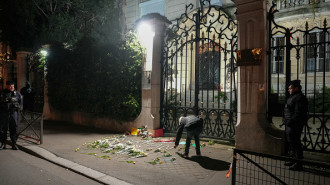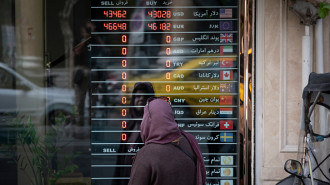2022 Arab Opinion Index: Public divided over success of Arab Spring uprisings
Public opinion among Arab populations is divided on the outcome of the Arab Spring pro-democracy revolutions of 2010-11, according to statistics from the 2022 Arab Opinion Index.
The index is an annual survey conducted by the Arab Centre for Research and Policy Studies in order to gauge public opinion across the Arab world on political and cultural matters.
The 2022 poll, which included interviews with 33,300 people across 14 Arab countries, found that 46 percent of the public considered the initial uprisings in 2011 as positive.
Fewer, however, were optimistic about the legacy of the pro-democracy uprisings with 40 percent saying the pro-democracy movement is facing obstacles but will eventually reach its goals.
Around 39 percent believe the revolutions had come to an end and that the old, autocratic styles of government had returned. This was most recently seen in Tunisia, until recently considered one of the success stories of the Arab Spring, where President Kais Saied has assumed near-dictatorial authority following a 2021 power-grab.
The number of people with a positive view of the uprisings and those hopeful for the future of the movements has declined over the past years. 58 percent, for example, said they viewed the uprisings as favourable in 2021.
The pro-democracy uprisings began in late 2010 and early 2011, when millions of people across the Arab world demonstrated against autocratic governments, demanding freedom, democracy, and social justice.
The movement began in Tunisia, where protestors successfully toppled longtime leader Zine El-Abidine Ben Ali and paved the way for a transition to democracy.
Protests soon spread to neighbouring countries, including Egypt in early 2011. Millions of Egyptians took to the streets to demand an end to the autocratic rule of Hosni Mubarak, who eventually left power. The uprisings in Tunisia and especially Egypt ignited hope among millions of Arabs across the region.
"People see Egypt as the heart of the Arab world," said Lamis Andoni, Middle East analyst at The New Arab. "The moment it started in Egypt, the people thought it was an Arab uprising, not an Egyptian uprising."
Syrians, Libyans, Yemenis, and Bahrainis joined the pro-democracy demonstrations in 2011, and there was hope that the protests in Syria especially would be successful.
"The Arab Spring appeared like a new dawn. At that moment, people thought they would have freedom, social justice, democratic governments, [and] governments that were not subservient to foreign powers such as the US," said Andoni.
"The Arab uprising broke the barrier of fear and silence. People dared to speak. That has been achieved by the Arab uprising. They are challenging their governments till today"
However, the Arab Spring was followed by counter-revolutions which managed to extinguish and suppress the pro-democracy protests. Egypt’s revolution was contained by the country's military, which overthrew the newly-elected Muslim Brotherhood government with army general turned defence minister Abdel Fattah al-Sisi installed as president in 2014.
Sisi is still in power and has clamped down on any kind of dissent or activism since his 2013 coup against democratically elected President Mohammed Morsi.
The government in Bahrain, the only Gulf state which saw large-scale demonstrations, responded with brute force and managed to stop the demonstrations.
Syria’s fate was the most tragic. While the initial protests coalesced around demands for freedom, dignity, and democracy, the country's political and military opposition were beset by infighting. President Bashar al-Assad’s forces viciously suppressed the protestors, killing thousands.
This, combined with the emergence of radical militias such as the Islamic State group, completely undermined the revolution. Hundreds of thousands have since been killed and millions displaced in a conflict that is still ongoing.
Tunisia, which was viewed as the success story of the Arab Spring, has also fallen into authoritarianism.
Tunisians placed their trust in Kais Saied - a social conservative who sought to appeal to younger voters, pledged to combat corruption, and said he wanted to strengthen the democratic system. He was elected in a landslide in 2019.
However, since then Saied has dismissed parliament, dismantled Tunisia's democratic institutions undermined the judicial system, and rewritten the constitution to solidify his grip on power.
Yet Andoni said the Arab Spring movement did have its successes, making people more likely to speak out against their governments.
"The Arab uprising broke the barrier of fear and silence. People dared to speak. That has been achieved by the Arab uprising. They are still challenging their governments today," she said.
"But the fear is coming back again," she added. "What has changed is that there were setbacks [to free speech]. We are witnessing again a return of tyranny, or a return of the suppression of freedom of expression."
That fear, in part, stems from the fate of Syria, according to Andoni, which was destroyed by the Assad regime and its allies as it sought to cling to power.
"Part of the disillusionment is that many people in some countries are afraid they will have the same fate as Syria," she said.
The Arab revolutions gave people hope that their leadership could change for the better, a hope which was soon dashed by the success of counter-revolutionaries and a return to autocratic, corrupt politics.
This is reflected in the results of the Arab Opinion Index - respondents have over the years maintained hope that their countries could overcome the obstacles in the path to democracy, but that hope is fading with each passing year.



